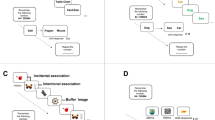Abstract
We report two studies examining the effects of nicotine on memory in minimally deprived smokers. In experiment 1, semantically related words were recalled significantly better than unrelated words following nicotine, even when volunteers were explicitly instructed to target the unrelated word set for recall. Experiment 2 examined the effect of nicotine on two different types of lexical association: association by joint category membership (semantically related items), and association by derived meaning (”encapsulated” word pairs). Nicotine-induced improvements in recall were observed only for category associates and not for encapsulated word pairs. This implies that explicit, effortful processing of material in the presence of nicotine is necessary for improved recall performance to be observed.
Similar content being viewed by others
Author information
Authors and Affiliations
Additional information
Received: 15 October 1997 / Final version: 13 November 1997
Rights and permissions
About this article
Cite this article
Rusted, J., Graupner, L., Tennant, A. et al. Effortful processing is a requirement for nicotine-induced improvements in memory. Psychopharmacology 138, 362–368 (1998). https://doi.org/10.1007/s002130050682
Issue Date:
DOI: https://doi.org/10.1007/s002130050682




